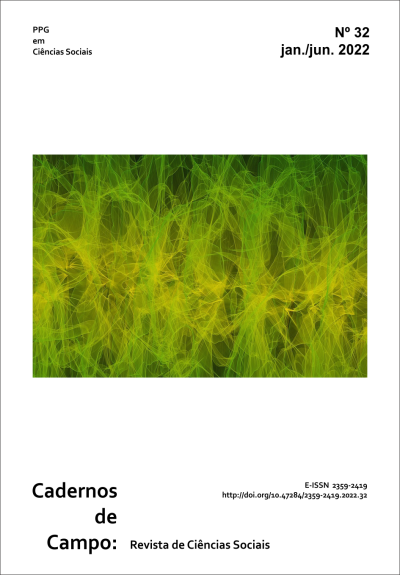Colonialidade do poder e precariedade governamental
Uma reflexão sobre o Estado brasileiro à luz do trabalho doméstico remunerado
DOI :
https://doi.org/10.47284/2359-2419.2022.32.109136Mots-clés :
Trabalho Doméstico Remunerado, Interseccionalidade, Governamentalidade, Colonialidade do Poder, DecolonialidadeRésumé
O trabalho doméstico remunerado é um fato social total no Brasil cuja omnipresença é pouco discutida teórica e analiticamente a partir de sua relação com o Estado brasileiro. Ao articular a perspectiva da colonialidade do poder e da precariedade governamental, o presente artigo busca discutir justamente, desde uma perspectiva teórica, informada pela crítica decolonial e do feminismo negro, o lugar do trabalho doméstico remunerado, com suas dimensões raciais, de classe e de gênero, na sua relação com o Estado. Se analisará, em um primeiro momento, a relação entre a colonialidade do poder e o trabalho doméstico remunerado no Brasil. Em seguida, será abordada a precariedade governamental como governamentalidade da colonialidade do poder e suas consequências para a categoria socioprofissional, em especial durante a pandemia de Covid-19. Por fim, será apresentado o tensionamento entre o “avanço rumo ao passado”, diante do agravamento das condições sociais, e o “retorno do futuro”, graças às mobilizações e projetos emancipatórios.
Téléchargements
Références
ALMEIDA, S. Racismo estrutural. São Paulo: Ed. Jandaíra, 2020.
BENHABIB, S. The rights of others: aliens, residents and citizens. New York: Cambridge University Press, 2004.
BERNARDINO-COSTA, J. Saberes subalternos e decolonialidade: os sindicatos das trabalhadoras domésticas no Brasil. Brasília: Ed. da UnB, 2015.
CHANEY, E.; GARCIA CASTRO, M. (org.). Muchacha/cachifa/criada/empleada/ empregadinha/sirvienta/y... más nada: trabajadoras domésticas en América Latina y el Caribe. Caracas: Editorial Nueva Sociedad, 1993.
COLLINS, P. H. Pensamento feminista negro: conhecimento, consciência e a política do empoderamento. São Paulo: Boitempo, 2019.
FILLETI, J. P.; GORAYEB, D. S. Mulheres negras no mercado de trabalho no 4º trimestre de 2021. Boletim NPEGen Mulheres Negras no Mercado de Trabalho, Campinas, v. 2, n. 4, mar. 2022. Disponível em:
www.facamp.com.br/wp-content/uploads/2022/04/2021_4T_BMNMT.pdf. Acesso em: 24 abr. 2022.
FONTOURA, N.; MARCOLINO, A. A heterogeneidade do trabalho doméstico no Brasil. In: PINHEIRO, L. et al. (org.) Entre relações de cuidado e vivências de vulnerabilidade: dilemas e desafios para o trabalho doméstico e de cuidados remunerado no Brasil. Brasília: IPEA; OIT, 2021. p.105-124.
FOUCAULT, M. A governamentalidade. In: FOUCAULT, M. Microfísica do poder. 7. ed. Rio de Janeiro: Graal, 1979. Capítulo XVII, p. 277-293.
FRASER, N. Contradições entre capital e cuidado. Princípios: Revista de Filosofia, Natal, v. 27, n. 53, p. 261-288, 2020. Disponível em: https://periodicos.ufrn.br/principios/article/view/16876/12950. Acesso em: 28 out. 2021.
GONZALEZ, L. Primavera para as rosas negras: Lélia Gonzalez em primeira
pessoa. São Paulo: Diáspora Africana, 2018.
HIRATA, H.; KERGOAT, D. Novas configurações da divisão sexual do trabalho. Cadernos de Pesquisa, São Paulo, v. 37, n. 132, p. 595-609, 2007. Disponível em: www.fafich.ufmg.br/ppgs/wp-content/uploads/2020/09/6-HIRATA-Helena-e-KERGOAT-Dani%C3%A8le.-Novas-configura%C3%A7%C3%B5es-da-divis%C3%A3o-sexual-do-trabalho.-pp.-595-609.pdf. Acesso em: 27 out. 2021
HOCHSCHILD, A. R. Love and gold. In: EHRENREICH, B.; HOCHSCHILD, A. R. (org.). Global woman: nannies, maids, and sex workers in the new economy. New York: Holt Paperbacks, 2004. p. 15-30.
HOOKS, b. Teoria feminista: da margem ao centro. São Paulo: Perspectiva, 2019.
LIMA, M.; PRATES, I. Emprego doméstico e mudança social: reprodução e heterogeneidade na base da estrutura ocupacional brasileira. Tempo Social, São Paulo, v. 31, n. 2, p. 149-171, 2019. DOI: 10.11606/0103-2070.ts.2019.149291. Disponível em: www.revistas.usp.br/ts/article/view/149291. Acesso em: 19 ago. 2022.
LORDE, A. Irmã Outsider: ensaios e conferências. Belo Horizonte: Autêntica, 2019.
LOREY, I. Precarisation and care-citizenship. Griffith Law Review, Melbourne, 2019. Disponível em: https://doi.org/10.1080/10383441.2018.1595339. Acesso em: 29 ago. 2021.
MBEMBE, A. Critique de la Raison Nègre. Paris: Éditions La Découverte, 2015.
NASCIMENTO, A. Quilombismo: an Afro-Brazilian Political Perspective. Journal of Black Studies, Thousand Oaks, v. 11, n. 2, Afro-Brazilian experience and Proposals for Social Change, p. 141-178, dec. 1980. Disponível em: www.academia.edu/4480687/Quilombismo_An_Afro_Brazilian_Political_Alternative_Abdias_do_Nascimento. Acesso em: 07 set. 2021.
OFFE, C. Dominação de classe e sistema político: sobre a seletividade das instituições políticas, In: OFFE, C. (org.), Problemas estruturais do Estado Capitalista. Rio de Janeiro: Tempo Brasileiro, 1984. p. 141-177.
PIEDADE, V. Dororidade. São Paulo: Editora Nós, 2017.
PINTO, C. M. et al. (org.). Os sindicatos das trabalhadoras domésticas em tempos de pandemia: memórias da resistência. Santa Maria, RS: FACOS-UFSM, 2021.
PIZZINGA, V. H. Vulnerabilidade e atividades essenciais no contexto da COVID-19: reflexões sobre a categoria de trabalhadoras domésticas. Revista Brasileira de Saúde Ocupacional, São Paulo, v. 46, n.25, 2021. Disponível em: http://dx.doi.org/10.1590/2317-6369000025020. Acesso em: 24 out. 2021.
PRETA-RARA. Eu, empregada doméstica: a senzala moderna é o quartinho da empregada. Belo Horizonte: Letramento, 2019.
QUIJANO, A. ‘Bien vivir’: entre el ‘desarrollo’ y la des/colonialidad del poder. In: QUIJANO, A. (org.). Des/colonialidad y Bien Vivir: un nuevo debate en América Latina. Lima: Universidad Ricardo Palma Editorial Universitaria, 2014. p. 19-33.
QUIJANO, A. Colonialidad del poder, eurocentrismo y América Latina. In: LANDER, E. (org.). La Colonialidad del Saber: eurocentrismo y ciencias sociales, perspectivas latino-americanas. Buenos Aires: Clacso, 2003. p. 201-246.
SCOTT, J. C. Exploração normal, resistência normal. Revista Brasileira de Ciência Política, Brasília, n. 5, p.217-243, 2011.
Disponível em: https://periodicos.unb.br/index.php/rbcp/article/view/1764/1550. Acesso em: 15 nov. 2021.
SEGATO, R. Crítica da colonialidade em oito ensaios: e uma antropologia por demanda. Rio de Janeiro: Bazar do Tempo, 2021.
VALENZUELA, M. E.; SCURO, M. L.; VACA TRIGO, I. Desigualdad, crisis de los cuidados y migración del trabajo doméstico remunerado en América Latina. Santiago: Comisión Económica para América Latina y el Caribe, 2020. (Serie Asuntos de Género, n. 158).
VALERIANO, M. M.; DIAS TOSTA, T. L. Trabalho e família de trabalhadoras domésticas em tempos de pandemia: uma análise interseccional. Civitas, Porto Alegre, v. 21, n,3, p. 412- 422, set.-dez. 2021. Disponível em: http://dx.doi.org/10.15448/1984-7289.2021.3.40571. Acesso em: 03 mar. 2021.
Téléchargements
Publiée
Numéro
Rubrique
Licence
(c) Tous droits réservés Cadernos de Campo: Revista de Ciências Sociais 2022

Ce travail est disponible sous la licence Creative Commons Attribution 4.0 International .









